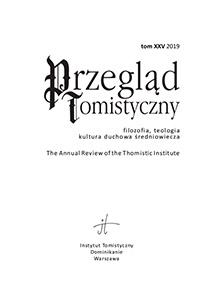MAGDALENA PŁOTKA, Bonaventure on Joy

Volume XXV: 2019
Philosophy — Theology — Spiritual culture of the Middle Ages
ISSN 0860-0015
e-ISSN 2544-1000
SUMMARY
The problems of joy in the work of Saint Bonaventure of Bagnoregio have a definitely theological context. And although we can find a careful separation in his works between the ultimate joy (happiness of the saved) and secular joy which is directed to worldly and sensual goods, it is impossible to describe the Bonaventurian concept of joy without frequent and numerous references to theological problems. So, the concept of joy appears in the contexts of Christian life, monastic issues, ascetic practice, etc., as one of the stages (though as we show, not the last one) of climbing up in human spiritual development. Bonaventure claimed that human joy – as a psychological experience, a volitional act aimed at its object (good), emotion – is not a morally neutral experience. The experience of joy is subject to moral evaluation depending on the relation in which the subject of this experience remains to Infinity.
Bonaventure left many fragments describing earthly joy, but since they are scattered over many of his works, they do not make up a compact description. Hence, this article attempts to reconstruct the Bonaventurian concept of joy and argues that Bonaventure developed a coherent concept of joy (resulting from Franciscan spirituality) in its dynamic, not static approach. The three subchapters of the article intend to show human experience of joy in its development from simple acts of sensual joy (part 1), by denying joy within the world- contempt (part 2), to achieve “perfect earthly joy” that is only possible after achieving the proper spiritual dispositio.
